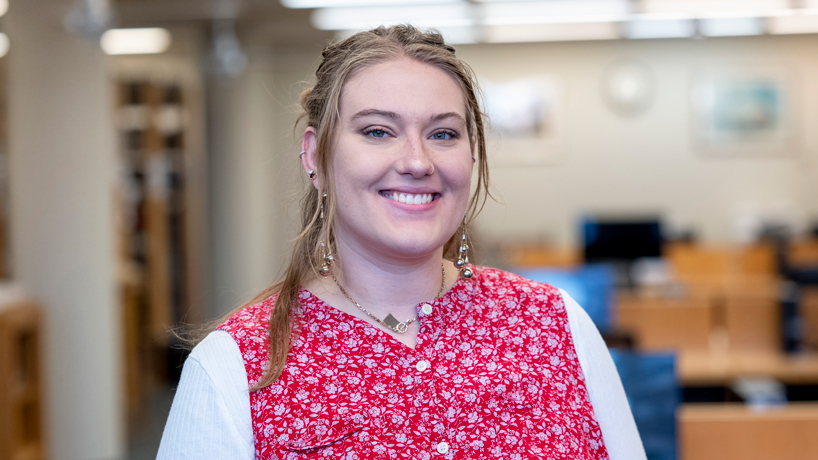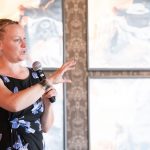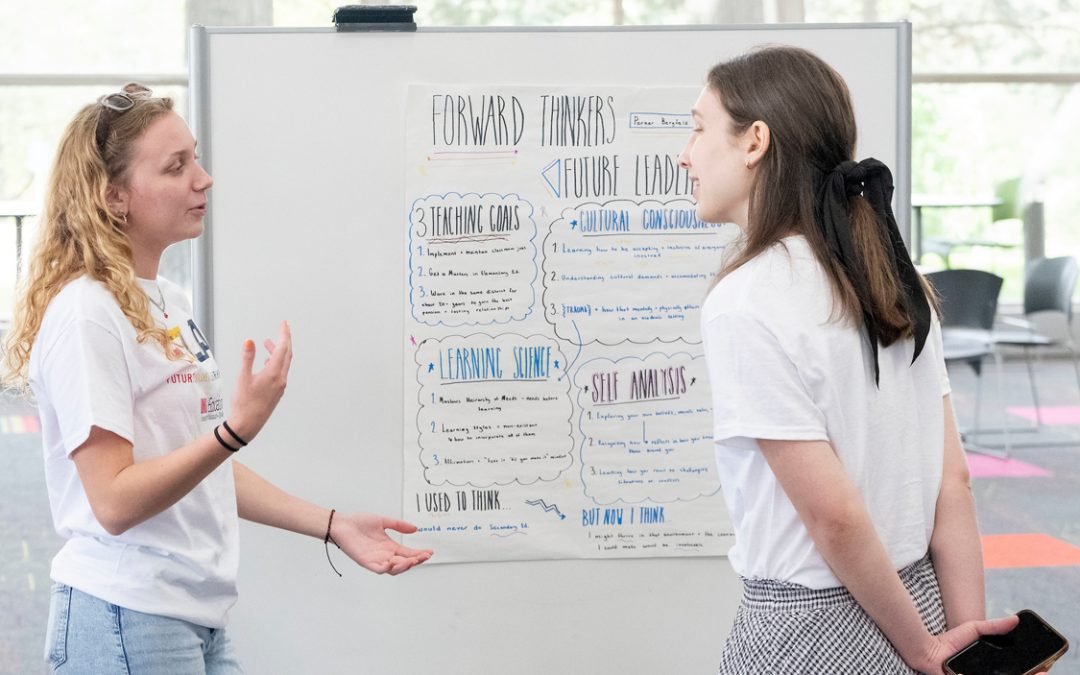
Anne Brown is majoring in psychology and sociology and is on track to graduate in May. She plans to pursue a PhD in sociology, and she’ll spend her final undergraduate semester conducting qualitative research at Bridge of Hope Ministries in The Ville neighborhood in north St. Louis. (Photo by August Jennewein)
Anne Brown was running really low on confidence as she applied for research assistant positions at the University of Missouri–St. Louis in the winter of 2020.
She’d already been turned down for several opportunities, and she was beginning to think her academic record – which included some struggles dating to when she was first starting out at Colorado College – might keep her from ever getting the chance to gain the experience she longed for, working in a lab as she tried to plot her future path.
“That’s when I interviewed with Dr. Casad,” Brown said.
That’d be Bettina Casad, an associate professor in the Department of Psychological Sciences and the director of UMSL’s Behavioral Neuroscience Program. She offered Brown the chance to work as an undergraduate research assistant in her lab, investigating the links between experiences of stigma to psychological well-being, educational and career achievements, and physical health.
Brown points to that as a seminal moment in her life, which nearly two years later, has her on track to graduate this May with a bachelor’s degree in psychology and sociology. She has plans to conduct a research and evaluation project at local nonprofit Bridge of Hope Ministries over the next five months while awaiting word about graduate school to pursue a PhD in sociology.
“I’d been struggling for so long,” Brown said. “Honestly, so far my entire college career had been a struggle. I was getting knocked around in my confidence and my self-image. I think when somebody looked past my not really great transcript and was willing to give me a chance, I think that changed how I was looking at myself and the things that I was capable of doing.”
Something missing
Casad’s recollection is a bit different. She doesn’t remember seeing anything lacking in Brown’s academic record, but that wasn’t ever her main focus.
“She was motivated and passionate about psychology and wanted to gain more experience,” Casad said. “I look for students who show excitement about research, and it seemed to me she would be hardworking.”
Brown has proven to be all of those things. She just needed a reminder.
School had never been difficult for Brown growing up. She got good grades and was a three-sport varsity athlete at St. Charles High School. She was even chosen to attend the National Student Leadership Conference at American University in the summer before her senior year.
She’d gone to Colorado College to play basketball on an ROTC scholarship after graduation and expected to use her time there to position herself for medical school. Brown had always looked up to her sister Shelby – 16 years her elder – who is now a doctor with Washington University Physicians.
But college didn’t go as smoothly as Brown or anyone else expected. She struggled being away from home and managing the responsibility that accompanied her newfound independence. She left Colorado College before the end of her first year and came back to St. Louis, working a series of part-time jobs while taking general education classes at St. Louis Community College.
Brown kept that up for two years, still not sure what direction she wanted her future to take.
“I was getting toward this precipice and thinking, ‘I need to start making some decisions,’” she said.
Her first choice
Brown decided to enroll at UMSL in the spring of 2019. It was a logical next step based on its proximity. Her sister had earned her bachelor’s degree in biology at the university in 2004 before attending medical school at the University of Missouri–Columbia.
She was happy to find plenty of supports and greater opportunities at UMSL than she’d had in community college, but her struggles didn’t end immediately.
“My first semester here was really tough,” Brown said. “Then I started to open up with my family about the struggles I was having, and I sought some professional help. That changed everything. I started to get a little bit more motivated and inspired by the things I was doing. I had more drive to push myself.”
In the process, she started reflecting on the subjects that had always interested her, and she thought back to a summer research program she had in high school where she studied the effects of epinephrine on zebrafish.
“Stuff like that always interested me,” Brown said.
She had already declared psychology as her major and thought working in a research lab would be a way to enhance her knowledge and understanding of the subject matter.
She interviewed with Casad and secured the research assistant position about a week before the onset of the COVID-19 pandemic closed UMSL’s campus and pushed classes online for the remainder of the Spring 2020 semester. So Brown’s earlier research experience didn’t look like she imagined it would.
“I didn’t feel like I missed a beat,” she said. “We met weekly or two times a week, and then all through the spring, and in the summer, we were still doing virtual conference posters. I was still learning how to run analyses from Dr. Casad teaching us over Zoom.”
A renewed focus
The experience has been even better the past year and half since she and her fellow students have been able to work in-person. She’s had the opportunity to take part in a variety of projects while figuring out where her interests lie, and she’s learned a lot from both Casad and doctoral student Christina Garasky.
Last spring, Brown presented at the Undergraduate Research Symposium, sharing survey data she collected on the threatening educational environment women in STEM majors experience. Her research, conducted at a Midwestern university, showed that greater classroom gender disparities predicted devaluing behavior, but a positive campus climate for women seemed to mitigate that behavior.
Brown’s interests have also stretched beyond psychology. She discovered a strong fascination with social problems, and she decided to add sociology as a second major. She also began doing some research as an assistant under Assistant Professor Elaina Johns-Wolfe.
Last January, Brown started volunteering at Bridge of Hope, a day shelter located in The Ville neighborhood in north St. Louis that helps families in crisis out of poverty and addiction, and she found a passion for the work.
“Anne has the ability to come into an environment that doesn’t look like her, that isn’t representative of her, and she has a cultural competency to people able to work with the people we serve,” Bridge of Hope Director Kelli Braggs said. “It’s not easy to come into a community where it’s a predominantly Black neighborhood, a predominantly male environment. But the people love Anne. She just has a very innate way of dealing with our community that is very genuine. She’s won the community’s trust.”
Last spring, as she was getting more deeply involved in her volunteer work, she was also enrolled in a community-based research course taught by Associate Teaching Professor Larry Irons. As the semester wore on, Brown started to wonder if she could have a bigger impact at Bridge of Hope by conducting community-based research for the organization.
Preparing for the future
Last fall, Brown started talking to Irons and Braggs about what such a project could look like if she did it for independent study credit. Braggs, who took over leadership of the program last summer, was excited about the possibilities.
“She understood that we were applying for grants,” Braggs said. “In the past, we had not really been able to get grants from governments or corporations, and I told her one of the missing pieces that I’ve notice with Bridge of Hope that they were missing was just the data, the research. A lot of times when you’re applying for grants, they want to understand what the impact is going to be, those measurable goals.
“I knew that when I came in, we were going to do things that could be more measurable. Anne has started the process of doing the research to see, based upon the program model that we wanted to implement, what it showed in yield for people who are in similar situations – being unhoused and having substance and mental health challenges.”
Brown intends to collect data throughout the semester through a series of semi-structured qualitative interviews, then will use next summer to compile her findings and write a final report.
She hopes the experience will benefit her as she moves into the next chapter of her academic career. She’s awaiting an acceptance to a PhD program in sociology and also has been applying to master’s programs.
Brown has come a long way from the person she was when she went to Colorado with vague dreams of going to medical school. Her interests have shifted, and she’s overcome challenges, but she’s confident she’s where she’s supposed to be.
“I think I need to hit the next level,” Brown said, “and see what else I can learn and do with this.”














